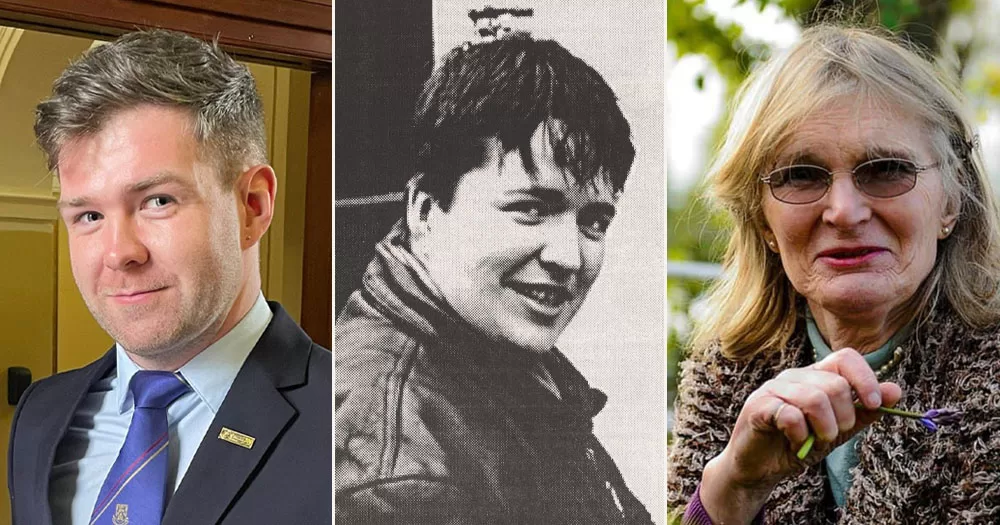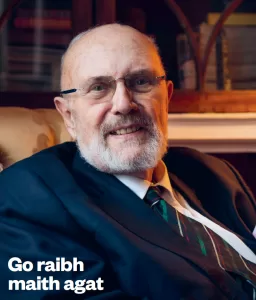With February marking LGBTQ+ History Month, Han Tiernan takes a look at some of the unsung LGBTQ+ firsts whose bravery in standing up and standing out made Ireland a more accepting country.
2023 marked the 50th anniversary of the formation of the Sexual Liberation Movement, commonly recognised as the start of modern LGBTQ+ activism in Ireland. Since then, the country has experienced a seismic shift in the legal rights afforded to the LGBTQ+ community and the acceptance and visibility of queer culture.
Whilst much has been written about the fight for decriminalisation and David Norris’s bravery in challenging his right to privacy in Europe, many more of the civil liberties that we now consider commonplace began with the determination of trailblazers. Here are just a few of the lesser-acknowledged LGBTQ+ people who were the first to pave the way for our freedoms.
MEDIA VISIBILITY
From the earliest days of LGBTQ+ activism, the Irish Gay Rights Movement (IGRM) were acutely aware of the power of the media, in particular television. In 1975, just one year after the group’s formation, David Norris became the first self-identifying gay person to appear on Irish television on the magazine show Last House.
Two years later, RTÉ produced a groundbreaking documentary exploring gay and lesbian life titled Tuesday Report: Homosexuality in Ireland. Whilst Joni Crone is often remembered as being the first lesbian on Irish television, this accolade actually goes to Fil Carson, who appeared in the documentary.
Despite this, Crone’s appearance on The Late Late Show in 1980 was still seminal in so far as she was the first openly lesbian person on a live show and, more notably, on the most popular programme on Irish television at the time.
In August 1980, two more LGBTQ+ firsts for visibility in Ireland came about when two transgender people were interviewed by reporter Áine O’Connor in a segment on the RTÉ programme Summerhouse. Simply identifying as Claire and Isabel, they discussed the country’s first trans group, Friends of Eon, and the difference between cross-dressing and identifying as a gender different from their assigned sex.
BLOOD BAN
Since the 1980s, as a result of the AIDS crisis, Ireland had implemented a lifetime ban on gay, bisexual and other men who have sex with men (gbMSM) from donating blood. The Irish Blood Transfusion Service (IBTS) asserted, “At the time the association between HIV and transfusion was first noted, tests for HIV were non-existent and, when introduced, there was a long period of risk between acquiring the disease and the test becoming positive”. This ban was lifted in 2017 when a restriction of 12 months of abstinence was imposed before gbMSM would be permitted to donate.
Whilst this change was implemented as a result of years of lobbying by LGBTQ+ rights groups and sexual health organisations, it was accelerated by another legal challenge.
On July 27, 2015, Tomás Heneghan from Galway mounted a case to have the ban overturned in the High Court. Believing that it was his civic duty and moral right to give blood, he argued that the questionnaire and interview process employed by the IBTS failed to properly assess the risk of disease transmission posed by his donation. He also identified that the ban was in breach of EU law.
Heneghan describes: “I wanted to know why this ban was in place, what was the actual scientific and medical reason for it. I spent hours, days, weeks and months researching the issue. I needed to know why the ban existed, and I wanted an apology for what I viewed as homophobic treatment by a national health service.”
Heneghan dropped his lawsuit when it was announced that the ban would be lifted, and on January 16, 2017, he became the first gay man in Ireland to donate blood since the 1980s.
However, dissatisfied with the 12-month waiting period and believing the intrusive questioning to breach his right to privacy under the European Convention on Human Rights, on May 20, 2019, he began another legal challenge.
He also identified that the IBTS’s own guidelines on the period that it takes for the virus to be detected in blood contravened the 12-month ban.
Once again, Heneghan dropped his second suit when, on March 28, 2022, the waiting period was reduced to four months and was dependent on an individual risk assessment system, regardless of gender or sexual orientation.
EMPLOYMENT
Although some LGBTQ+ people still face discrimination in the workplace on the grounds of their gender or sexual orientation, it is widely condemned, and legislation exists to prohibit the practice. However, this was not always the case.
Throughout the late ’80s and early ’90s, LGBTQ+ rights organisations and trade unions were lobbying the Law Reform Commission and government to introduce laws prohibiting such forms of discrimination, but it wasn’t until Donna McAnallen took an unfair dismissal case that these groups could cite any precedent to bolster their arguments.
In 1993, McAnallen, who hailed from Belfast, had been working at the Brookfield Leisure Centre in Cork as a lifeguard and fitness instructor. When she was allegedly seen kissing her girlfriend in the centre’s changing rooms, management dismissed her from her post with immediate effect.
McAnallen brought a case to the Labour Court against Brookfield, asserting that her dismissal contravened the 1977 Employment Equality Act on the grounds of sexual orientation. Her legal counsel maintained that had a man and a woman been caught kissing, they would not be reprimanded in the same way, if at all, and as such, McAnallen’s dismissal was akin to sexual harassment.
The final judgement found that McAnallen had been treated unfairly in the manner in which she had been dismissed – without being given an opportunity to address the allegations or without being placed under due warning – however, the ruling refuted the claim that the dismissal breached the 1977 Employment Equality Act. In 1998, sexual orientation was eventually included in an amendment, with McAnallen’s case being cited on several occasions in support of its inclusion.
GENDER RECOGNITION
While many significant LGBTQ+ firsts took place in the intervening years, such as the first same-sex couples being registered on birth certificates and the introduction of civil partnership, the passing of the Gender Recognition Act was somewhat subsumed by Ireland becoming the first country in the world to introduce same-sex marriage by public vote in the same year.
In acknowledgement of her enormous contribution to the Act, on September 25, 2015, Dr Lydia Foy rightly became the first person to be granted legal recognition of her gender change. 22 years after she applied to the Registrar General to have her gender changed on her birth certificate, the government finally enacted the Gender Recognition Act, awarding Dr Foy a European Medal of Honour along with her new birth certificate.
Four years after she had first been refused permission to amend her birth certificate, Dr Foy challenged the decision in the High Court in 1997. With the support of FLAC (The Free Legal Aid Centre), she challenged the decision on the grounds that it contravened the European Convention on Human Rights. Ten years later, the High Court finally found in favour of Dr Foy. However, it would take a second legal challenge in 2013 before the government would give a firm commitment to finally enact the legislation.
With so many monumental changes having been achieved in Ireland throughout the last half a century, let’s take inspiration from those brave firsts who raised their heads above the parapet and continue to fight to create a brighter future for all the LGBTQ+ community.
This article originally appeared in Issue 381 of GCN magazine.
© 2024 GCN (Gay Community News). All rights reserved.
This article was published in the print edition Issue No. 381 (December 1, 2023). Click here to read it now.
Support GCN
GCN is a free, vital resource for Ireland’s LGBTQ+ community since 1988.
GCN is a trading name of National LGBT Federation CLG, a registered charity - Charity Number: 20034580.
GCN relies on the generous support of the community and allies to sustain the crucial work that we do. Producing GCN is costly, and, in an industry which has been hugely impacted by rising costs, we need your support to help sustain and grow this vital resource.
Supporting GCN for as little as €1.99 per month will help us continue our work as Ireland’s free, independent LGBTQ+ media.

